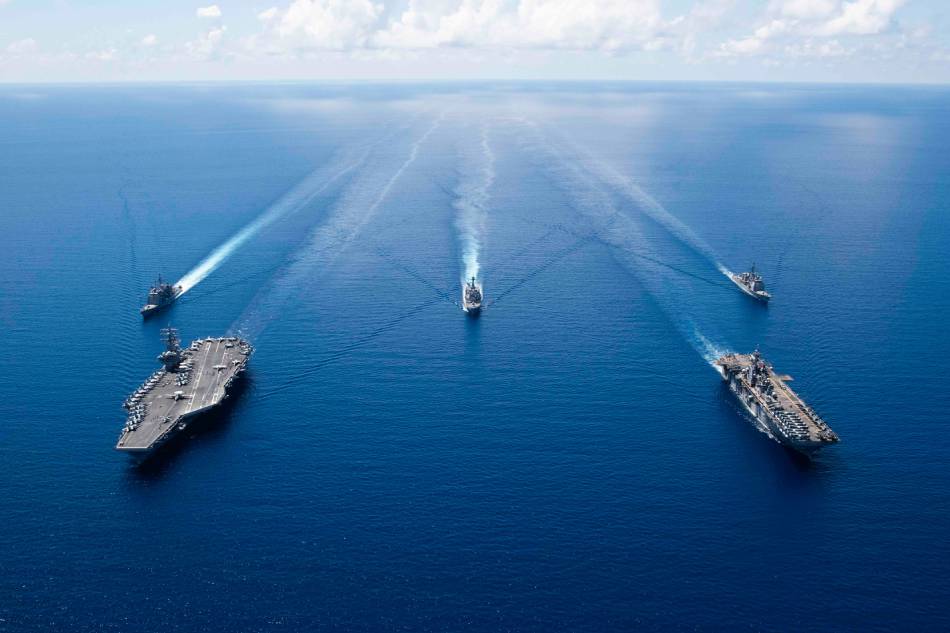Philippines, US, Japan, Australia 'not ganging up' on China over joint drills: AFP | ABS-CBN

Welcome, Kapamilya! We use cookies to improve your browsing experience. Continuing to use this site means you agree to our use of cookies. Tell me more!
Philippines, US, Japan, Australia 'not ganging up' on China over joint drills: AFP
Philippines, US, Japan, Australia 'not ganging up' on China over joint drills: AFP
Pia Gutierrez,
ABS-CBN News
Published Aug 28, 2023 06:22 PM PHT
MANILA — The Philippines, the United States, Japan, and Australia are not "ganging up" on China, the Philippine military chief said Monday, as the four countries hold joint naval drills in the South China Sea.
MANILA — The Philippines, the United States, Japan, and Australia are not "ganging up" on China, the Philippine military chief said Monday, as the four countries hold joint naval drills in the South China Sea.
“Japan, US, Australia and the Philippines are not—I repeat—not ganging up on China. We are doing this for our own interests,” said Lt. Gen. Romeo Brawner, chief of staff of the Armed Forces of the Philippines (AFP).
“Japan, US, Australia and the Philippines are not—I repeat—not ganging up on China. We are doing this for our own interests,” said Lt. Gen. Romeo Brawner, chief of staff of the Armed Forces of the Philippines (AFP).
"Pati ang mga bansa na ito they have their own interests. And when we get together as like-minded nations, we achieve more," Brawner told reporters at the sidelines of the National Heroes' Day commemoration rites at the Libingan ng mga Bayani in Taguig City.
"Pati ang mga bansa na ito they have their own interests. And when we get together as like-minded nations, we achieve more," Brawner told reporters at the sidelines of the National Heroes' Day commemoration rites at the Libingan ng mga Bayani in Taguig City.
(These countries also have their own interests.)
(These countries also have their own interests.)
ADVERTISEMENT
The joint naval exercises came weeks after a confrontation at the Ayungin (Second Thomas) Shoal of the West Philippine Sea earlier in August, when the Chinese Coast Guard (CCG) blocked and sprayed water cannons at Philippine Coast Guard vessels attempting to resupply Filipino troops garrisoned in the hotly contested territory.
The joint naval exercises came weeks after a confrontation at the Ayungin (Second Thomas) Shoal of the West Philippine Sea earlier in August, when the Chinese Coast Guard (CCG) blocked and sprayed water cannons at Philippine Coast Guard vessels attempting to resupply Filipino troops garrisoned in the hotly contested territory.
While the US, Japan, and Australia had declared support for the Philippines and condemned Beijing's actions following the incident, Brawner was quick to clarify that the joint drills were not new to the Philippine military and that they were "not addressed to one specific country."
While the US, Japan, and Australia had declared support for the Philippines and condemned Beijing's actions following the incident, Brawner was quick to clarify that the joint drills were not new to the Philippine military and that they were "not addressed to one specific country."
"It is very good that we interact with other militaries because in that way, we develop our capabilities, in terms of training, especially in the use of modern weapons, tactics, at bukod doon nagiging interoperable tayo," Brawner said.
"It is very good that we interact with other militaries because in that way, we develop our capabilities, in terms of training, especially in the use of modern weapons, tactics, at bukod doon nagiging interoperable tayo," Brawner said.
(And aside from that, we become more interoperable.)
(And aside from that, we become more interoperable.)
AFP TO STOP SENDING OFFICERS TO CHINA
Meanwhile, Brawner said that the AFP would no longer send military officers to China for training in response to Beijing's continued encroachment in the West Philippine Sea.
Meanwhile, Brawner said that the AFP would no longer send military officers to China for training in response to Beijing's continued encroachment in the West Philippine Sea.
ADVERTISEMENT
Since 2004, the Philippines had been sending military officers to Beijing under a defense cooperation agreement between the two countries.
Since 2004, the Philippines had been sending military officers to Beijing under a defense cooperation agreement between the two countries.
“Pero sa ngayon po dahil sa nangyayari sa South China Sea ay ihinto muna natin ang pagpapadala ng opisyales sa China,” he said.
“Pero sa ngayon po dahil sa nangyayari sa South China Sea ay ihinto muna natin ang pagpapadala ng opisyales sa China,” he said.
(But for now, because of what has been happening in the South China Sea, we will stop sending officers to China.)
(But for now, because of what has been happening in the South China Sea, we will stop sending officers to China.)
Brawner also noted that due to renewed tensions in the South China Sea, Beijing’s proposal to hold joint drills with Manila seemed far from becoming reality, unless China stops its “coercive and dangerous tactics” in the disputed waters.
Brawner also noted that due to renewed tensions in the South China Sea, Beijing’s proposal to hold joint drills with Manila seemed far from becoming reality, unless China stops its “coercive and dangerous tactics” in the disputed waters.
“We believe in the promotion of a rules-based international order. At iyon ang hiling natin sa China na sumunod sila,” he said.
“We believe in the promotion of a rules-based international order. At iyon ang hiling natin sa China na sumunod sila,” he said.
ADVERTISEMENT
(And we would like China to follow that order.)
(And we would like China to follow that order.)
RELATED VIDEO:
Read More:
China
Philippines
United States
Japan
Australia
Beijing
South China Sea
West Philippine Sea
Armed Forces of the Philippines
Romeo Brawner
ADVERTISEMENT
ADVERTISEMENT


